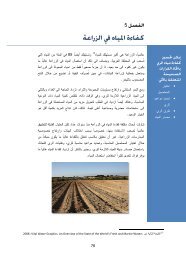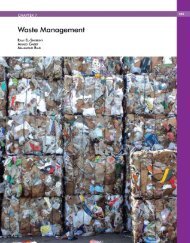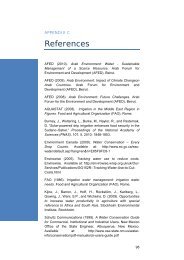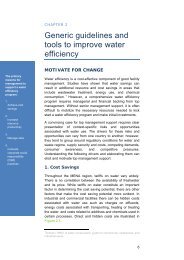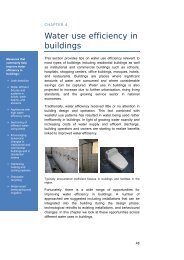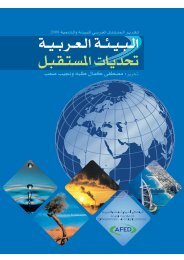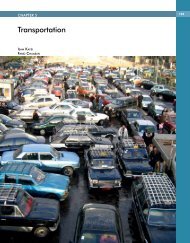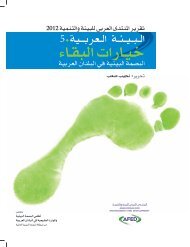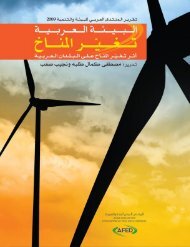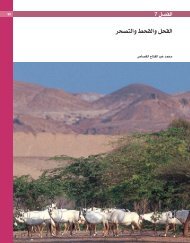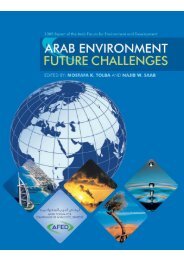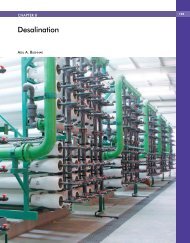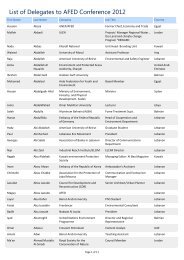Impact of Climate Change on Arab Countries - (IPCC) - Working ...
Impact of Climate Change on Arab Countries - (IPCC) - Working ...
Impact of Climate Change on Arab Countries - (IPCC) - Working ...
Create successful ePaper yourself
Turn your PDF publications into a flip-book with our unique Google optimized e-Paper software.
14<br />
CHAPTER 2<br />
GHG EMISSIONS: MITIGATION EFFORTS IN THE ARAB COUNTRIES<br />
TABLE 1<br />
I. INTRODUCTION<br />
The ultimate objective <str<strong>on</strong>g>of</str<strong>on</strong>g> the United Nati<strong>on</strong>s<br />
Framework C<strong>on</strong>venti<strong>on</strong> <strong>on</strong> <str<strong>on</strong>g>Climate</str<strong>on</strong>g> <str<strong>on</strong>g>Change</str<strong>on</strong>g><br />
(UNFCCC) is the stabilizati<strong>on</strong> <str<strong>on</strong>g>of</str<strong>on</strong>g> greenhouse<br />
gas c<strong>on</strong>centrati<strong>on</strong>s in the atmosphere at a level<br />
that would prevent dangerous anthropogenic<br />
interference with the climate system.<br />
Accordingly, under Article 4.1(b) <str<strong>on</strong>g>of</str<strong>on</strong>g> the<br />
C<strong>on</strong>venti<strong>on</strong>, all Parties, including the <strong>Arab</strong><br />
countries, are required to undertake efforts to<br />
reduce greenhouse gases (GHG) emissi<strong>on</strong>s and<br />
or enhance GHG sinks (UNFCCC, 1992).<br />
As climate change is a global problem, it calls<br />
for a global soluti<strong>on</strong> taking into c<strong>on</strong>siderati<strong>on</strong><br />
the principle agreed up<strong>on</strong> in the Rio declarati<strong>on</strong><br />
in 1992, namely the principle <str<strong>on</strong>g>of</str<strong>on</strong>g> “comm<strong>on</strong><br />
but differentiated resp<strong>on</strong>sibilities.” This<br />
implies that developed countries, which are historically<br />
resp<strong>on</strong>sible for the largest part <str<strong>on</strong>g>of</str<strong>on</strong>g> the<br />
accumulated GHGs in the atmosphere, should<br />
take the lead in reducing GHG emissi<strong>on</strong>s given<br />
their higher technological and financial capabilities.<br />
Developing countries, including the<br />
<strong>Arab</strong> countries, are requested to do their best to<br />
adopt development activities utilizing less energy,<br />
less water, and fewer raw materials, and to<br />
produce less waste.<br />
FIRST NATIONAL COMMUNICATIONS OF THE<br />
ARAB COUNTRIES<br />
First nati<strong>on</strong>al Communicati<strong>on</strong><br />
Country<br />
2001 Algeria<br />
2005 Bahrain<br />
2003 Comoros<br />
2002 Djibouti<br />
1999 Egypt<br />
1997 Jordan<br />
1999 Leban<strong>on</strong><br />
2002 Mauritania<br />
2001 Morocco<br />
2005 Saudi <strong>Arab</strong>ia<br />
2003 Sudan<br />
2001 Tunisia<br />
2007 United <strong>Arab</strong> Emirates<br />
2001 Yemen<br />
Source: http://unfccc.int/nati<strong>on</strong>al_reports/n<strong>on</strong>-annex_i_natcom/items/2979.php<br />
Mitigati<strong>on</strong> refers to efforts to reduce greenhouse<br />
gas emissi<strong>on</strong>s and to capture greenhouse<br />
gases through land use changes such as forestati<strong>on</strong><br />
or carb<strong>on</strong> capture and storage in deep geological<br />
formati<strong>on</strong>s. Policies and measures to<br />
reduce greenhouse gas emissi<strong>on</strong>s include<br />
improving energy efficiency to reduce energy<br />
c<strong>on</strong>sumpti<strong>on</strong> per unit <str<strong>on</strong>g>of</str<strong>on</strong>g> ec<strong>on</strong>omic output,<br />
switching to low or zero carb<strong>on</strong> fuels such as<br />
switching from oil to natural gas, and using<br />
renewable energy sources such as solar and<br />
wind energy.<br />
This chapter discusses the efforts undertaken<br />
by <strong>Arab</strong> countries to mitigate GHG emissi<strong>on</strong>s.<br />
It should be noted that such mitigati<strong>on</strong> efforts<br />
are not necessarily undertaken within nati<strong>on</strong>al<br />
climate change policies; rather, in most<br />
instances they have been adopted to achieve<br />
certain ec<strong>on</strong>omic, social, or envir<strong>on</strong>mental<br />
objectives. This chapter draws mainly <strong>on</strong> two<br />
sources <str<strong>on</strong>g>of</str<strong>on</strong>g> informati<strong>on</strong>, nati<strong>on</strong>al communicati<strong>on</strong>s<br />
<str<strong>on</strong>g>of</str<strong>on</strong>g> some <strong>Arab</strong> countries submitted as part<br />
<str<strong>on</strong>g>of</str<strong>on</strong>g> their obligati<strong>on</strong>s within the UNFCCC and<br />
informati<strong>on</strong> available in the public domain. At<br />
present, 14 <strong>Arab</strong> countries have submitted their<br />
initial nati<strong>on</strong>al communicati<strong>on</strong>s; n<strong>on</strong>e has submitted<br />
their sec<strong>on</strong>d communicati<strong>on</strong>s yet.<br />
Initial nati<strong>on</strong>al communicati<strong>on</strong>s are meant to<br />
be the major source <str<strong>on</strong>g>of</str<strong>on</strong>g> informati<strong>on</strong> <strong>on</strong> the steps<br />
taken to mitigate climate change. So far, however,<br />
they rarely include detailed assessments <str<strong>on</strong>g>of</str<strong>on</strong>g><br />
past and/or <strong>on</strong>going mitigati<strong>on</strong> projects or<br />
activities; they focus instead <strong>on</strong> projects, activities<br />
or programs and measures that are envisaged<br />
for the future. Am<strong>on</strong>g the 14 initial<br />
nati<strong>on</strong>al communicati<strong>on</strong>s investigated, <strong>on</strong>ly<br />
Saudi <strong>Arab</strong>ia’s report does not c<strong>on</strong>tain a secti<strong>on</strong><br />
<strong>on</strong> mitigati<strong>on</strong>. Most <str<strong>on</strong>g>of</str<strong>on</strong>g> the initial nati<strong>on</strong>al<br />
communicati<strong>on</strong>s have become outdated as<br />
some date back to as early as 1997 (Jordan),<br />
while the most recent <strong>on</strong>e is that <str<strong>on</strong>g>of</str<strong>on</strong>g> the UAE<br />
(2007) (Table 1).<br />
Apart from the initial nati<strong>on</strong>al communicati<strong>on</strong>s,<br />
documentati<strong>on</strong>s <str<strong>on</strong>g>of</str<strong>on</strong>g> <strong>Arab</strong> efforts to reduce<br />
GHG emissi<strong>on</strong>s are very scarce. Thus, it is likely<br />
that some <str<strong>on</strong>g>of</str<strong>on</strong>g> the <strong>on</strong>going or planned activities<br />
have been overlooked due to a lack <str<strong>on</strong>g>of</str<strong>on</strong>g> informati<strong>on</strong>.<br />
On the other hand, whenever enough<br />
data was available, various <strong>Arab</strong> experiences <strong>on</strong><br />
specific mitigati<strong>on</strong> areas are highlighted.<br />
The Council <str<strong>on</strong>g>of</str<strong>on</strong>g> <strong>Arab</strong> Ministers Resp<strong>on</strong>sible for<br />
the Envir<strong>on</strong>ment (CAMRE) at its 19 th sessi<strong>on</strong><br />
in 2007 adopted the <strong>Arab</strong> Ministerial



